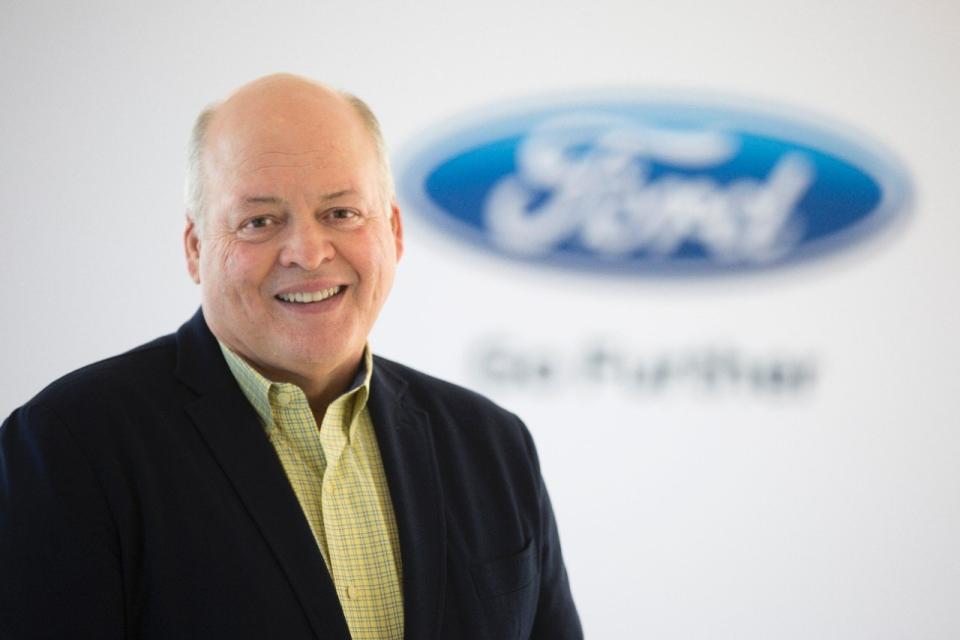It’s Wall Street vs. Detroit — and with Mark Fields out at Ford, Wall Street is winning

Ford
Mark Fields is out as Ford CEO.
The news on Monday that Ford CEO Mark Fields will step down wasn’t entirely surprising.
Fields oversaw the carmaker’s recovery from the Great Recession and its most profitable year ever, 2016, when the company made almost $11 billion.
But Ford shares slid 30% under his leadership, as investors steadily worried about slackening auto profits in a US sales downturn, even as the US market surged, setting new high marks in 2015 and 2016.
Now Jim Hackett, a former Steelcase CEO and Ford board member, will take over. Hackett is close with Ford Chairman Bill Ford and has been focused on forward-looking strategic thinking as Chairman of Ford’s Smart Mobility division. Fields had been an outspoken advocate for Ford’s efforts to transform itself into a mobility force, but as the former head of the North American business, he was also closely tied to the company’s traditional operations.
It was a delicate balancing act that Fields, 58, looked to managing effectively until recently when at Ford’s annual shareholders meeting, issues around the lagging stock price came to a head.
“Mark Fields has been an outstanding leader and deserves a lot of credit for all he has accomplished in his many roles around the globe at Ford,” Bill Ford said in a statement. “His strong leadership was critical to our North American restructuring, our turnaround at the end of the last decade, and our record profits in the past two years.”
It’s unclear whether Hackett, 62, will remain in the role as CEO. The management shakeup also saw Jim Farley, 54, and Joe Hinrichs, 50, elevated to new jobs as Executive Vice-Presidents: both men will effectively supervise Ford’s global auto operations, given that Hackett has no prior experience in the car business before becoming a Ford director.
“We’re moving from a position of strength to transform Ford for the future,” Bill Ford said.
“Jim Hackett is the right CEO to lead Ford during this transformative period for the auto industry and the broader mobility space. He’s a true visionary who brings a unique, human-centered leadership approach to our culture, products and services that will unlock the potential of our people and our business.”

Ford
Ford’s new CEO, Jim Hackett.
The mobility-company challenge
Reaction to Fields’ departure was quick.
“Mark Fields took a long-term approach to making Ford a mobility company,” said Rebecca Lindland, an analyst at Kelley Blue Book, in an email.
“However, investors — which include the super-voting shares the Ford family owns and just confirmed again at the annual meeting May 11 — we’re not so patient. Following [former CEO] Alan Mulally was never going to be easy, and Fields held his own, but the reality was he couldn’t rally the troops internally and pacify investors and the Ford family externally.”
The role of Wall Street in Ford’s shakeup can’t be underestimated. During a nearly seven-year expansion, the share prices of General Motors and Ford have either barely budged or slid lower. Both carmakers have made money hand over fist as Americans bought profitable large SUVs and pickups, but theoretically disruptive upstarts — chiefly Tesla — have garnered investor attention.
Tesla sells less cars in a year than Ford does in a month, but its market cap has surpassed both GM’s and Ford’s. Meanwhile, Uber currently has a valuation of between $60 billion to $70 billion.
Wall Street is making big bets on the future while essentially ignoring legacy automakers’ present-day performance, which by any estimate has been impressive.
Ford is at base a family business — Bill Ford was CEO before Mulally too over before the financial crisis — and the family seemed to have reached the end of its patience with the declining stock price. As it did with Mulally, who came to Ford from Boeing, the company looks to be willing to take a chance that another industry outsider can improve the stock performance.
Mark Fields was a great salesman, and as CEO, he delivered sales and profits. But in the end, bolstering Ford’s balance sheet and solidifying its position in core segments wasn’t enough.
More from Matthew DeBord:
Spring has arrived, so here’s a step-by-step guide to fixing a scratch on your car
Tesla’s future is completely inhuman — and we shouldn’t be surprised (TSLA)
An extremely rare 1967 Corvette is up for auction — and it could fetch $500,000 (GM)
Get the latest Ford stock price here.
NOW WATCH: This is what a $400K Ford looks like
Please enable Javascript to watch this video
The post It’s Wall Street vs. Detroit — and with Mark Fields out at Ford, Wall Street is winning appeared first on Business Insider.



